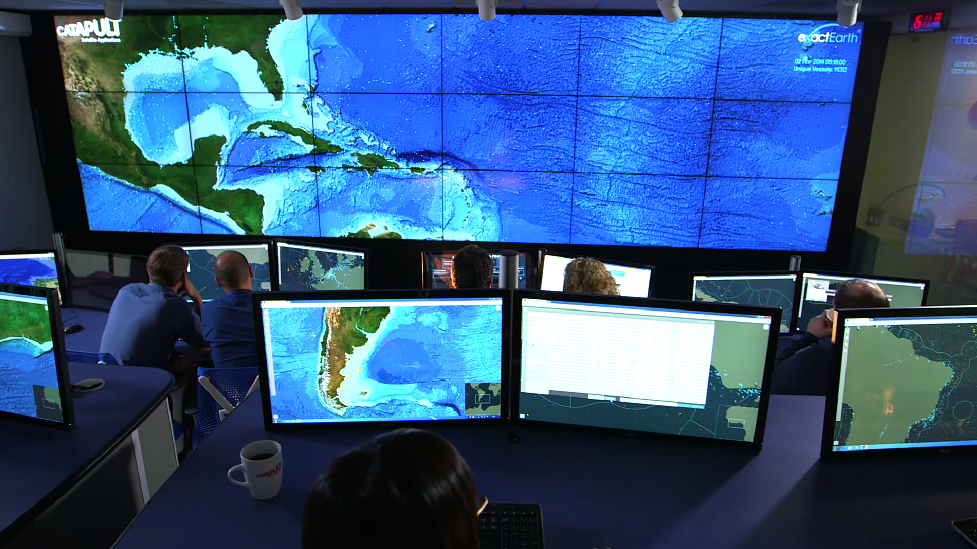Pew Unveils Pioneering Technology to Help End Illegal Fishing
Live satellite system will monitor waters of Chile and Palau
Washington—The Pew Charitable Trusts launched groundbreaking technology today that will help authorities monitor, detect, and respond to illicit fishing activity across the world’s oceans. The development of Project Eyes on the Seas, as the system is known, furthers a long-term effort by Pew to dramatically reduce illegal or “pirate” fishing.
The system is being developed in partnership with Satellite Applications Catapult, a British company established through a U.K. government initiative. The technology analyzes multiple sources of live satellite tracking data and then links to information about a ship’s ownership history and country of registration, providing a dossier of up-to-the-minute data that can alert officials to suspicious vessel movements.
Experts estimate that up to $23.5 billion worth of fish enter the world market each year from illegal fishing, which averages to approximately 1 in 5 fish caught in the wild. In some regions, as much as 40 percent of the catch is thought to have been caught unlawfully. This theft persists largely because industrial-scale pirate fishers know that nobody is watching them. Project Eyes on the Seas aims to solve that problem by offering authorities for the first time a real-time comprehensive monitoring and analysis system of activity on the water.
“Project Eyes on the Seas is designed to transform the current very expensive and patchy system of information gathering and enforcement into a global system for identifying and tracking illegal fishing vessels that is far more cost effective. This system will enable authorities to share information on those vessels operating outside of the law, build a comprehensive case against them, track them into port or within reach of enforcement vessels, and take action against them,” said Joshua Reichert, executive vice president of The Pew Charitable Trusts, who leads Pew’s environment work.
Project Eyes on the Seas will launch initially with a “Virtual Watch Room” monitoring the waters surrounding Easter Island, a Chilean territory, and the Pacific island nation of Palau. Pew and its partners are working with each nation and island community to establish large, fully protected marine reserves in these waters.
“With Pew’s assistance, we’ve already identified suspicious vessels in our marine zone,” said Palau President Tommy E. Remengesau, Jr. “Now, the Virtual Watch Room’s enhanced features will help ensure that once the Palau National Marine Sanctuary is established, the marine life within our waters will be protected from illegal fishing.”
The Virtual Watch Room is intended to pay immediate dividends in remote ocean areas where governments are considering establishing marine reserves to safeguard some of the planet’s last remaining near-pristine marine habitats. Over the next three years, the plan is for Project Eyes on the Seas to grow in capability and scope as more countries, regional fisheries management organizations, and seafood retail groups commit to using it to guarantee that only legally caught seafood is taken from the ocean and reaches consumers’ plates.
“Satellite data are playing a key role in helping to put an end to illegal fishing,” said Stuart Martin, CEO of Satellite Applications Catapult. “Through the tenacity of The Pew Charitable Trusts and the technological advancements developed by Catapult and industry players, protecting our seas and the livelihood of many villages can now become a reality rather than an idealistic goal. Catapult is delighted to be able to play a part in this.”
###
The Pew Charitable Trusts is driven by the power of knowledge to solve today’s most challenging problems. Learn more at www.pewtrusts.org.
Satellite Applications Catapult is an innovation and technology company established through a U.K. government initiative to foster economic growth through the exploitation of space.


Palau Builds on Its Ocean Conservation Legacy
1 year after creating large marine protected area, island nation maintains long-held commitment to safeguard local waters


The Virtual Watch Room
Pioneering technology to monitor and protect marine reserves


This video is hosted by YouTube. In order to view it, you must consent to the use of “Marketing Cookies” by updating your preferences in the Cookie Settings link below. View on YouTube
This video is hosted by YouTube. In order to view it, you must consent to the use of “Marketing Cookies” by updating your preferences in the Cookie Settings link below. View on YouTube









